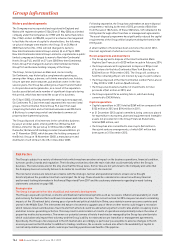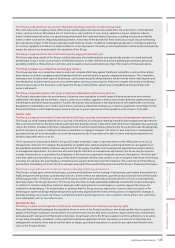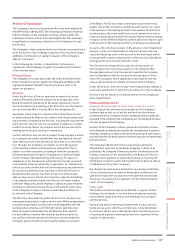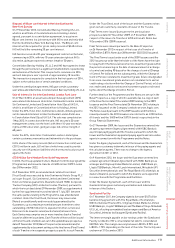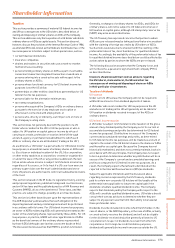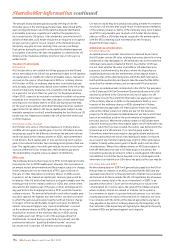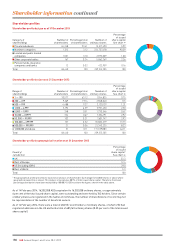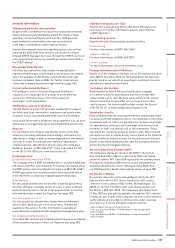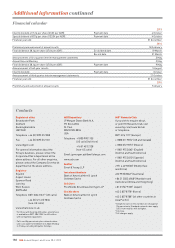Holiday Inn 2013 Annual Report Download - page 176
Download and view the complete annual report
Please find page 176 of the 2013 Holiday Inn annual report below. You can navigate through the pages in the report by either clicking on the pages listed below, or by using the keyword search tool below to find specific information within the annual report.
The amount of any dividend paid in pounds sterling will be the
US dollar value of the sterling payments made, determined at the
spot sterling/US dollar rate on the date the dividend distribution
is includible in income, regardless of whether the payment is in
fact converted into US dollars. If the dividend is converted into US
dollars on that date, a US holder should not be required to recognise
foreign currency gain or loss in respect of the dividend income.
Generally, any gain or loss resulting from currency exchange
fluctuations during the period from the date the dividend payment
is includible in income to the date the payment is converted into US
dollars will be treated as ordinary income or loss, from sources
within the US.
Taxation of capital gains
UK taxation
A US holder who is not resident for UK tax purposes in the UK and
who is not trading in the UK will not generally be liable for UK taxation
on capital gains, or eligible for relief for allowable losses, realised or
accrued on the sale or other disposal of ADSs or ordinary shares.
A US holder of ADSs or ordinary shares who is an individual and
who, broadly, has temporarily ceased to be resident in the UK or has
become temporarily treated as non-resident for UK tax purposes
for a period of not more than five years (or, for departures before
6 April 2013, ceases to be resident or ordinarily resident or becomes
treated as non-resident for less than five years of assessment) and
who disposes of ordinary shares or ADSs during that period may,
for the year of assessment when that individual becomes resident
again in the UK, be liable to UK tax on capital gains (subject to any
available exemption or relief), notwithstanding the fact that such US
holder was not treated as resident in the UK at the time of the sale
or otherdisposal.
US federal income taxation
A US holder who sells or otherwise disposes of ordinary shares
or ADSs will recognise a capital gain or loss for US federal income
taxpurposes equal to the difference between the amount realised
and its tax basis in the ordinary shares or ADSs, each determined
inUS dollars. Such capital gain or loss will be long-term capital
gain or loss where the holder has a holding period greater than one
year. The capital gain or loss will generally be income or loss from
sources within the US for foreign tax credit limitation purposes.
The deductibility of capital losses is subject tolimitations.
PFIC rules
The Company believes that it was not a PFIC for US federal income
tax purposes for its 2013 taxable year. However, this conclusion is
an annual factual determination and thus may be subject to change.
If the Company were to be treated as a PFIC, gain realised on
the sale or other disposition of ordinary shares or ADSs would,
in general, not be treated as capital gain. Instead, gain would be
treated as if the US holder had realised such gain rateably over the
holding period for the ordinary shares or ADSs and, to the extent
allocated to the taxable year of the sale or other exchange and to
any year before the Company became a PFIC, would be taxed as
ordinary income. The amount allocated to each other taxable year
would be taxed at the highest tax rate in effect for each such year
to which the gain was allocated, together with an interest charge
in respect of the tax attributable to each such year. In addition,
similar rules would apply to any “excess distribution” received
on the ordinary shares or ADSs (generally, the excess of any
distribution received on the ordinary shares or ADSs during
the taxable year over 125 per cent of the average amount of
distributions received during a specified prior period), and the
preferential rates for “qualified dividend income” received
by certain non-corporate US holders would not apply.
Certain elections may be available (including a market-to-market
election) to US holders that would result in alternative treatments
of the ordinary shares or ADSs. If the Company were to be treated
as a PFIC in any taxable year in which aUS holder held ordinary
shares or ADSs, a US holder may be required to file annual reports
with the IRS containing such information as the Treasury
Department may require.
Additional tax considerations
UK inheritance tax
An individual who is neither domiciled nor deemed domiciled in
theUK (under certain UK rules relating to previous domicile or long
residence) is only chargeable to UK inheritance tax to the extent the
individual owns assets situated in the UK. As a matter of UK law,
it is not clear whether the situs of an ADS for UK inheritance tax
purposes is determined by the place where the depositary is
established and records the entitlements of the deposit holders,
orby the situs of the underlying share which the ADS represents,
but the UK tax authorities are likely to take the view that the ADSs,
as well as the ordinary shares, are or represent UK situs assets.
However, an individual who is domiciled in the US (for the purposes
of the Estate and Gift Tax Convention (Convention)) and is not a UK
national as defined in the Convention will not be subject to UK
inheritance tax (tothe extent UK inheritance tax applies) in respect
of the ordinary shares or ADSs on the individual’s death or on a
transfer of the ordinary shares or ADSs during their lifetime,
provided that any applicable US federal gift or estate tax is paid,
unless the ordinary shares or ADSs are part of the business
property of a UK permanent establishment or pertain to a UK fixed
base of an individual used for the performance of independent
personal services. Where the ordinary shares or ADSs have been
placed in trust by a settlor, they may be subject to UK inheritance tax
unless, when the trust was created, the settlor was domiciled in the
US and was not a UK national. If no relief is given under the
Convention, inheritance tax may be charged on death and also on
the amount by which the value of an individual’s estate is reduced
as a result of any transfer made by way of gift or other undervalue
transfer, broadly within seven years of death, and in certain other
circumstances. Where the ordinary shares or ADSs are subject to
both UK inheritance tax and to US federal gift or estate tax, the
Convention generally provides for either a credit against US federal
tax liabilities for UK inheritance tax paid or for a credit against UK
inheritance tax liabilities for US federal tax paid, as the case may be.
UK stamp duty and SDRT
Neither stamp duty nor SDRT will generally be payable in the UK on
the purchase or transfer of an ADS, provided that the ADS and any
separate instrument or written agreement of transfer are executed
and remain at all times outside the UK. UK legislation does however
provide for stamp duty (in the case of transfers) or SDRT to be
payable at the rate of 1.5 per cent on the amount or value of the
consideration (or, in some cases, the value of the ordinary shares)
where ordinary shares are issued or transferred to a person
(or a nominee or agent of a person) whose business is or includes
issuing depositary receipts or the provision of clearance services.
In accordance with the terms of the deposit agreement, any tax or
duty payable on deposits of ordinary shares by the depositary or by
the custodian of the depositary will typically be charged to the party
to whom ADSs are delivered against such deposits.
174 IHG Annual Report and Form 20-F 2013
Shareholder information continued


